Why modders won't let Morrowind slide into oblivion
Morrowind is special—so special, modders can't resist recreating it in every subsequent Elder Scrolls game.
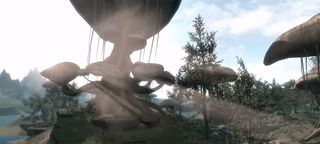
We've republished this feature to celebrate Morrowind's 15th birthday.
For millions of players, Morrowind was their introduction to the world of The Elder Scrolls, but even Elder Scrolls veterans who cut their teeth on Arena and Daggerfall left Morrowind with an impression that lasted. For some of those players, Morrowind made such an impression that they never wanted to leave at all. Those fans have spent the past years painstakingly updating Morrowind, brick by brick, texture by texture, into Bethesda’s more modern engines.
Even returning to Morrowind 14 years later, it’s easy to see why. Morrowind's island setting of Vvardenfell offsets a few standard fantasy clichés—a villain who lairs in a wasteland of volcanic ash and dwarven ruins full of monsters—but also more visionary ideas. There's a prison inside a moon floating over a city built on a lake, a transport network of giant fleas controlled by riders who directly manipulate their steeds' nervous systems, and a settlement where most of the buildings are the hollowed-out shells of gigantic dead creatures. Vvardenfell is a memorable place, more outlandish than anything seen in the Elder Scrolls games that preceded or followed it.
Morrowind was also the first Elder Scrolls game to come with a Creation Kit, a gift from Bethesda that gave players the opportunity to alter that world and make it their own. The best mods tended to leave the setting be and instead tinker with the clunky RPG mechanics it was filtered through, changing the way leveling works and the rate skills improve and so on.
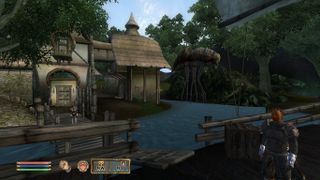
The Morrowind of tomorrow
Bethesda would continue experimenting with those mechanics in later games, alongside making technical improvements like the obvious graphical ones as well as the additon of full voice acting and tweaks to the animations (it took until Skyrim for people to be able to move their legs the right way when running diagonally). Since both Oblivion and Skyrim came with their own Creation Kits, they were just as moddable as Morrowind. While many of Morrowind's mods anticipated future improvements, the most ambitious mods for Oblivion and Skyrim are those that look back, inserting the entirety of Morrowind's setting and story into the newer games. They're called Morroblivion and Skywind, and each is a massive undertaking that has required teams of modders and years of volunteer work.
A modder who posts on the forums at The Elder Scrolls Renewal Project as Brainslasher points me to a Morroblivion History thread that breaks down the timeline. It began with a modder named Galadrielle whose dream was to remake Vvardenfell in Oblivion, but with a new story that would occur during the same time period. Later modders re-imagined Morroblivion as a straight re-telling of the original, unwilling to alter the game they loved beyond some visual and mechanical improvements. As Brainslasher puts it, they were motivated by “love for this game and its crazy world with its weird architecture and creatures, the hostile world that you as a player are thrown into without knowing anything about it.”
(Someone suggests their next project right there in that history thread: “Now let's do it all again with Morroskyrim!”)
The biggest gaming news, reviews and hardware deals
Keep up to date with the most important stories and the best deals, as picked by the PC Gamer team.
It’s not every RPG that goes so far as to have its own saucy novels.
That “crazy world” is something that gets brought up again and again in my conversations with people who worked on these overhauls. They talk about its dwarves going beyond beery miner stereotypes to become a culture of Babylonian steampunk objectivists, or Hlormar Wine-Sot, the drunken barbarian who enlists your help in getting his clothes back from a witch. One of them namechecks The Lusty Argonian Maid, a book of in-setting erotic fiction. It’s not every RPG that goes so far as to have its own saucy novels, but that level of commitment to detailing every part of the setting is what inspired similar commitment in its fans.
Morroblivion can be played right now, but Skywind is still in development, and has been for four years. Will Jordan, who posts to The Elder Scrolls Renewal Project forum as Smitehammer, has been there for two and a half of those years, joining just as Skywind changed scope from simply porting the old game into a new engine to what he calls “a full re-imagining of Morrowind”. That means creating a lot of new designs from scratch, guided by the concept art, rather than simply inserting objects from Morrowind and cranking the textures up. It also means creating new quests to fill in gaps and adding new dialogue so that NPCs can chat to each other rather than just the player.
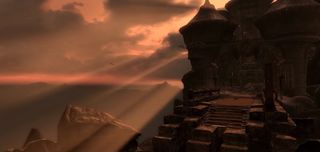
Jordan is both a writer and one of the team leads in the voice acting department alongside Taerkalith, aka Benjamin Iredale, who has been working on Skywind for almost as long, hopping from job to job. “I've done a bit of West Gash landscaping, creating the initial river design through the canyons, worked on spells such as Silence and Icarian Flight, and helped jumpstart the music and SFX departments which had slowed down about a year ago,” Iredale says. “They're now some of our healthiest departments. Also a bit of quest fixing and dialogue implementation, but that overlaps closely with my department so it comes with the territory of voice acting.”
Coordinating voice actors is a big job, since Morrowind was very heavy on the text and only a handful of NPC greetings (and one god) were voiced. “Early on it entailed acquiring all the text data for the scripts and coming up with a method of identifying appropriate lines by NPC and creating scripts,” says Iredale. “Now I'm doing implementation of the voicetypes/voicefiles which entails working in the Creation Kit along with third-party supporting applications.”
Jordan actually started as one of the actors, inspired by the performer whose greeting is the first you hear in the game. “Jeff Baker came up with a very unique voice for the male Dunmer which few people on the team could match. I learned rudimentary sound editing and recording techniques to improve my audio quality, and began coaching others on how to improve their own sound quality and acting—forming ideas on how each race should sound for some internal consistency.”
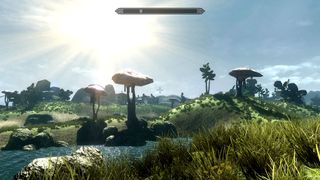
It's a lot of work for volunteer pay, but I really enjoy the community and almost everyone laughs or plays along with my jokes so I think I'll be staying.
Corpus X
Michael Pewtress, aka SFX team lead Corpus X, is a more recent addition to the team. He's been part of what he calls “the Skywind universe” for just over seven months, though he'd been following the project for a couple of years before that. “When I came in for a visit last September it felt like nothing was happening and I thought I could offer my help to get it going,” he said. “When I joined I was just an SFX contributor, but the team lead at the time left the project about a month or two into my tenure so we ran team leadless until I took over in December. It's a lot of work for volunteer pay, but I really enjoy the community and almost everyone laughs or plays along with my jokes so I think I'll be staying.”
Very few of Skywind's modders worked on Morroblivion and some of them, like Pewtress, have never worked on a game before at all. “This has been a fun learning experience,” he says. Iredale, on the other hand, worked on personal mods before stepping up to join Skywind. Given how long it's been and the still unfinished state of Skywind—though some of the screenshots they've shown and the videos on their YouTube channel make their achievements so far look very impressive—I ask if there’s some worry that a new Elder Scrolls game will come out before Skywind does.
Iredale isn't bothered, saying, “There is a good chance we'll release before the next Elder Scrolls game if they keep to their typical timetable. Even if we released shortly afterward, I think people would still want to play it, as the graphics and gameplay are still faring decently with the assets we've been creating.”
As long as there's a Creation Kit in a new Elder Scrolls game, it'll be used to make Vvardenfell again.
Mewtress
Pewtress notes that Skyrim is still plenty popular, even though it's now almost five years old. “I'd say we have a least four years before something is released and I want my SFX guys done [with] our job in six months,” he says with enthusiasm. “Sound Effects Division Rules!”
When a new Elder Scrolls game comes out, whether it's set in Valenwood, Hammerfell, Black Marsh or any of the other provinces of Tamriel, it's possible that Morrowind will find itself being recreated by modders yet again in place of the new location. “Porting Skywind into Valenwind, Hammerwind, Blackwind, etc. would require a lot of additional asset creation and complicated data wrangling,” says Iredale. “There's a good chance it may be done, but I don't think the current team largely is interested in doing that.”
According to Mewtress, “As long as there's a Creation Kit in a new Elder Scrolls game, it'll be used to make Vvardenfell again.” He compares their slightly unhinged dedication to the Star Trek fans making fan films. “They're even getting sued by Paramount and that's not stopping them!”
Jordan agrees. “One interesting thing about Skywind is that nearly all the assets are our own. The animation skeletons are taken from Skyrim or modified from Skyrim's, but nearly all the textures, models, and a great deal of the sound effects and music are to be completely fan-made. This means if another Elder Scrolls game comes out using an updated engine, it would be fairly easy (and legal) to port over anything we've made. We're thinking long-haul for this project, laying the groundwork for not only the project in its current form, but planning for its future development. If we do the grunt work now, future TES modders will be able to focus on refining and embellishing without having to remake an entire game from scratch again.”
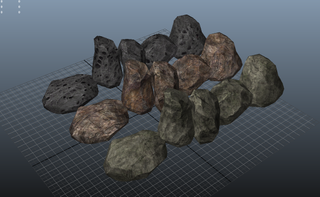
So what is it about Morrowind in particular that makes it worth rebuilding at least twice, if not more? “Morrowind, for me, was the first video game that truly realized a D&D world in three dimensions,” says Iredale. “The bizarre and complicated lore and religious-political hierarchies made it a world you wanted to know more and more about.”
“Developers like Michael Kirkbride went out if their way to make the world seem as alien as possible, while keeping suspense of disbelief possible,” says Jordan. “The world has all these fantastic creatures and strange architecture, but none of it looks out of place.” For him, an important moment came when he noticed relationships between the different stages in the lifecycle of the humble Kwama, which he calls “quadrupedal insecty things that are raised like cattle-chickens by the Dunmer for their eggs.”
Their adult forms, the Kwama Foragers, Workers, and Warriors, are encountered frequently by players, and inside the tunnels where they nest you can meet their Queens. But they also have a larval form, called Scribs, which you'll spot both in the wilderness and depicted on the signs that guide you to Vvardenfell's taverns (you can see one outside the South Wall Cornerclub in Balmora, for instance). Their eggs and cuttle turn up as items, and they're mentioned in passing in dreams and conversations, “just enough pieces to let your mind puzzle it all together in a way that makes sense.”
The individual pieces fit together like they would in a real culture, and the longer you spend inside the game, the more of those pieces assemble into something greater.
It's this sense of interconnectedness, from the lowly Kwama and their eggs all the way up to the legends of ascended gods Vivec, Almalexia, and Sotha Sil that makes Morrowind special. The individual pieces fit together like they would in a real culture, and the longer you spend inside the game, the more of those pieces assemble into something greater.
The Skywind team are doing impressive work on making Morrowind look and sound better, while also helping it become a little less frustrating to play thanks to Skyrim's mechanical improvements, all to allow the Morrowind we built up inside our heads as we first played it to live again. To some degree, though, no matter which game's variety of combat and leveling are applied to it, no matter which level of fidelity it's polished to, that version that will always live inside our imaginations.

Jody's first computer was a Commodore 64, so he remembers having to use a code wheel to play Pool of Radiance. A former music journalist who interviewed everyone from Giorgio Moroder to Trent Reznor, Jody also co-hosted Australia's first radio show about videogames, Zed Games. He's written for Rock Paper Shotgun, The Big Issue, GamesRadar, Zam, Glixel, Five Out of Ten Magazine, and Playboy.com, whose cheques with the bunny logo made for fun conversations at the bank. Jody's first article for PC Gamer was about the audio of Alien Isolation, published in 2015, and since then he's written about why Silent Hill belongs on PC, why Recettear: An Item Shop's Tale is the best fantasy shopkeeper tycoon game, and how weird Lost Ark can get. Jody edited PC Gamer Indie from 2017 to 2018, and he eventually lived up to his promise to play every Warhammer videogame.
Most Popular


